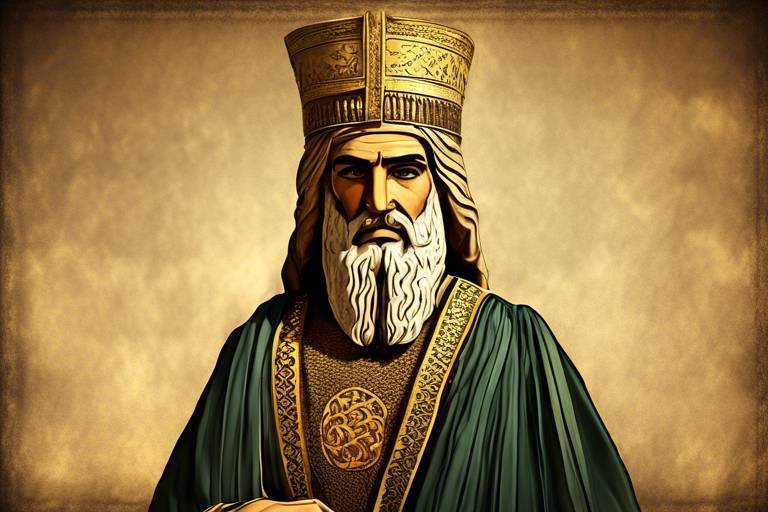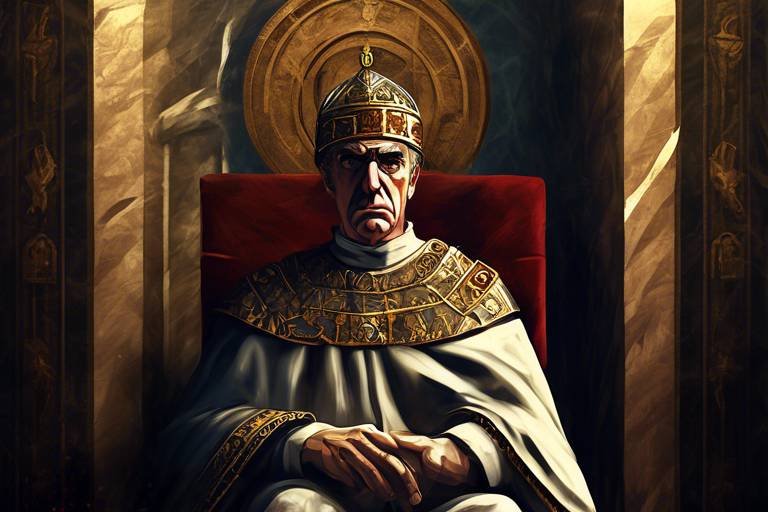Abraham Lincoln: The Great Emancipator
Abraham Lincoln, often hailed as the Great Emancipator, holds a significant place in American history for his pivotal role in leading the nation through one of its darkest periods. Born in a humble log cabin in Kentucky, Lincoln's journey from obscurity to the presidency is a remarkable tale of perseverance and determination. His legacy as the 16th President of the United States is deeply intertwined with his unwavering commitment to preserving the Union and ultimately abolishing slavery.

Early Life and Education
Abraham Lincoln, often hailed as the Great Emancipator, had a humble beginning in a log cabin in Kentucky. Born into poverty, Lincoln's early life was marked by hardship and struggle. Despite the lack of formal education, he had a thirst for knowledge and was a voracious reader, educating himself through books and teachings available to him.
Lincoln's upbringing instilled in him a strong sense of justice and fairness, shaping his character and laying the foundation for his future political endeavors. His experiences in poverty and adversity fueled his empathy for the marginalized and oppressed, influencing his views on equality and freedom.
As he grew older, Lincoln's interest in law and politics blossomed. He pursued a career in law, studying diligently and eventually becoming a successful lawyer. His legal background provided him with the skills and knowledge necessary for his future leadership roles in politics.
Lincoln's early life and education played a pivotal role in shaping his values and principles. His self-made success story and unwavering dedication to self-improvement are a testament to his resilience and determination. These qualities would define his legacy as one of the greatest leaders in American history.

Political Career and Presidency
Abraham Lincoln's political career and presidency marked a pivotal period in American history, defined by his unwavering leadership and commitment to preserving the Union. Rising from humble beginnings in Illinois, Lincoln's entry into politics was marked by his participation in the Illinois State Legislature and later his election to the U.S. House of Representatives. However, it was his debates with Stephen Douglas during the 1858 Illinois Senate race that catapulted him into the national spotlight.
Lincoln's election as the 16th President of the United States in 1860 came at a time of deep division between the North and the South, with the country on the brink of civil war. His presidency was characterized by the secession of Southern states and the subsequent outbreak of the Civil War in 1861. Despite facing immense challenges, Lincoln demonstrated a steadfast resolve to uphold the principles of the Constitution and preserve the Union at all costs.
During his presidency, Lincoln made crucial decisions regarding military strategy and leadership, including the appointment of key generals such as Ulysses S. Grant and William T. Sherman. His Emancipation Proclamation in 1863, which declared all slaves in Confederate-held territory to be free, further solidified his commitment to ending slavery and reshaping the course of the war.
Lincoln's leadership during the Civil War was marked by his ability to navigate political complexities and maintain a sense of moral clarity in the face of adversity. His Gettysburg Address in 1863, with its call for "a new birth of freedom," encapsulated his vision for a united and reconciled nation, even amidst the horrors of war.
As the war drew to a close, Lincoln focused on the task of reconstruction and healing the wounds of the nation. His second inaugural address in 1865, with its message of "malice toward none, with charity for all," reflected his compassionate approach to reuniting a fractured country.

The Civil War
The Civil War, a defining moment in American history, was a tumultuous period that tested the nation's unity and resolve. Abraham Lincoln, as the President of the United States during this critical time, faced immense challenges in leading the Union forces against the Confederacy. His strategic decisions and unwavering commitment to preserving the Union played a crucial role in shaping the outcome of the war.
One of the key aspects of Lincoln's leadership during the Civil War was his ability to navigate the complex military and political landscape of the time. He worked closely with his generals, such as Ulysses S. Grant and William T. Sherman, to develop effective strategies for winning crucial battles and gaining the upper hand against the Confederate forces.
Lincoln's determination to maintain the Union at all costs was evident in his unwavering support for the Northern cause. Despite facing setbacks and challenges on the battlefield, he remained steadfast in his commitment to ending the secessionist movement and preserving the United States as a single, indivisible nation.
The Civil War was a bloody and brutal conflict that exacted a heavy toll on both the North and the South. The scale of the devastation and loss of life during the war underscored the deep divisions that had torn the country apart. Lincoln's leadership during this turbulent period was marked by his efforts to heal these divisions and bring about a lasting peace that would reunite the nation.
Ultimately, the Civil War ended with the defeat of the Confederacy and the restoration of the Union. Lincoln's leadership and vision played a pivotal role in achieving this outcome, setting the stage for the reunification of the country and the eventual abolition of slavery through the Emancipation Proclamation.

The Emancipation Proclamation
Abraham Lincoln's issuance of the Emancipation Proclamation in 1863 marked a pivotal moment in American history, forever altering the course of the Civil War and the institution of slavery. This historic document declared that all enslaved individuals in Confederate-held territory were to be set free, effectively transforming the war into a moral crusade for freedom. Despite its limitations, the Emancipation Proclamation laid the groundwork for the eventual abolition of slavery and became a symbol of hope for millions of African Americans.

Assassination and Legacy
Abraham Lincoln's assassination on April 14, 1865, just days after the end of the Civil War, sent shockwaves across the nation. The tragic event took place at Ford's Theatre in Washington, D.C., where John Wilkes Booth, a Confederate sympathizer, shot the President. Lincoln's death marked a somber moment in American history, leaving the country in mourning and uncertainty about its future.
Despite his untimely death, Abraham Lincoln's legacy as the Great Emancipator endures to this day. His leadership during the Civil War and his commitment to ending slavery through the Emancipation Proclamation solidified his place in history as a champion of freedom and equality. Lincoln's assassination only served to heighten the reverence and admiration people had for him, immortalizing him as one of the greatest Presidents in American history.
Lincoln's assassination not only robbed the nation of a beloved leader but also raised questions about the future of the country and the path to reconciliation after the Civil War. The impact of his death reverberated throughout the nation, further emphasizing the need to uphold his vision of a united and free America. The legacy of Abraham Lincoln continues to inspire generations to strive for a more just and equitable society, reflecting his enduring influence on American values and principles.

Lincoln's Leadership Style
Abraham Lincoln's leadership style was defined by a unique blend of qualities that set him apart as a remarkable leader. His honesty and integrity were the cornerstones of his character, guiding his decisions and actions throughout his presidency. Lincoln's ability to communicate effectively with people from all walks of life allowed him to bridge divides and unite a nation torn apart by civil war.
One of Lincoln's greatest strengths as a leader was his humility and willingness to listen to diverse viewpoints. He surrounded himself with advisors who challenged his thinking, encouraging open dialogue and debate. This inclusive approach to leadership enabled Lincoln to make well-informed decisions that considered multiple perspectives.
Moreover, Lincoln's unwavering commitment to the principles of freedom and equality inspired others to follow his lead. His steadfast dedication to preserving the Union and abolishing slavery demonstrated his moral courage and conviction. By staying true to his values, Lincoln earned the respect and trust of the American people, even in the face of immense challenges.
Lincoln's leadership style can be likened to a steady lighthouse guiding a ship through turbulent waters. Just as a lighthouse provides a beacon of light and stability in a storm, Lincoln's leadership offered hope and direction during a dark period in American history. His legacy as the Great Emancipator continues to shine brightly, illuminating the path towards a more just and united society.

Impact on Civil Rights
Abraham Lincoln's impact on civil rights reverberates through history, transcending his time as President of the United States. His unwavering commitment to equality and justice laid the groundwork for future generations to continue the fight for civil rights. By signing the Emancipation Proclamation, Lincoln took a monumental step towards the abolition of slavery, setting a precedent for the recognition of basic human rights for all individuals regardless of race.
Lincoln's actions during his presidency not only led to the end of slavery but also sparked a shift in societal attitudes towards equality and freedom. His advocacy for the rights of all individuals, regardless of their background, resonates in the ongoing struggle for civil rights around the world. Lincoln's legacy serves as a beacon of hope and inspiration for those fighting against discrimination and injustice.
Moreover, Lincoln's impact on civil rights extended beyond his presidency, influencing future leaders and movements dedicated to advancing equality. The principles of fairness and justice that Lincoln championed continue to shape the discourse on civil rights today, reminding us of the enduring importance of upholding the rights and dignity of every individual.

Memorials and Commemoration
Abraham Lincoln's legacy as the Great Emancipator is commemorated through various memorials and celebrations that honor his contributions to American history and civil rights. Across the United States and around the world, numerous monuments stand as testaments to Lincoln's enduring impact on society. One of the most iconic memorials is the Lincoln Memorial in Washington, D.C., featuring a larger-than-life statue of Lincoln seated majestically. Visitors from all walks of life come to pay their respects and reflect on his leadership during a pivotal period in American history.
In addition to physical monuments, there are annual events and ceremonies held to commemorate Lincoln's birth, presidency, and the Emancipation Proclamation. These gatherings serve as reminders of the progress made in civil rights and the ongoing struggle for equality. Lincoln's image and words continue to inspire generations, symbolizing hope, unity, and the pursuit of a more just society.
Furthermore, educational institutions, libraries, and museums dedicated to Abraham Lincoln provide opportunities for individuals to learn about his life, principles, and impact on the nation. Exhibits showcasing artifacts from his presidency, speeches, and personal correspondence offer a glimpse into the mind of a leader who guided the country through one of its darkest hours.
Lincoln's legacy is not confined to the borders of the United States; his influence resonates globally, with international memorials and academic studies honoring his memory. Scholars and historians continue to analyze his leadership style, political decisions, and the lasting effects of his policies on modern governance and civil liberties.
Frequently Asked Questions
- 1. What were Abraham Lincoln's early life and education like?
Abraham Lincoln was born in a log cabin in Kentucky and had very limited formal education. He was mostly self-taught, reading books and educating himself on various subjects that interested him. His early life experiences and the influence of his family played a significant role in shaping his character and political beliefs.
- 2. How did Abraham Lincoln's leadership style impact his presidency?
Lincoln's leadership style was marked by his honesty, integrity, and ability to bring people together during a time of great division in the country. His calm and steady approach to decision-making, especially during the Civil War, earned him respect and admiration both from his supporters and opponents.
- 3. What was the significance of the Emancipation Proclamation?
The Emancipation Proclamation was a crucial executive order issued by Lincoln during the Civil War, declaring all enslaved individuals in Confederate-held territory to be free. While it did not immediately end slavery, it shifted the focus of the war to include the abolition of slavery as a key goal and laid the foundation for the eventual passage of the 13th Amendment.
- 4. How did Abraham Lincoln's legacy impact civil rights movements?
Lincoln's actions and policies as President, particularly his stance against slavery and his efforts to preserve the Union, set a precedent for future civil rights movements in the United States. His commitment to equality and justice inspired generations of activists and leaders in the fight for civil rights and social justice.



















